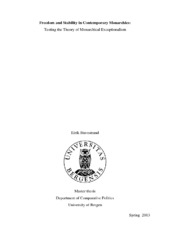| dc.description.abstract | This thesis investigates whether ruling monarchies are fundamentally different from other authoritarian regimes. The research question is Does having a monarchical regime type increase the degree of political liberalization and the level of political stability?" In recent years, observers have noted that Middle Eastern monarchies seem to have higher levels of political stability and more political freedom than the region's republics. This theory of monarchical exceptionalism" is tested in the thesis. The theory is tested by constructing a series of statistical models, and examining the effect of monarchy on different dependent variables. The analyses are performed on datasets covering the Middle East and the Asia-Pacific, a region with many former ruling monarchies. The results indicate that monarchies in both the Middle East and the Asia-Pacific generally have higher levels of liberalization, but that some types of political freedom, such as religious freedom, might be lower in monarchies. The results also indicate that Middle Eastern monarchies are more stable than the monarchies that have existed in the Asia-Pacific. Thus, although the latter group of monarchies have either collapsed or transitioned to constitutional monarchy in the past decades, the models reveal no indications of imminent regime change among Middle Eastern monarchies. | en_US |
